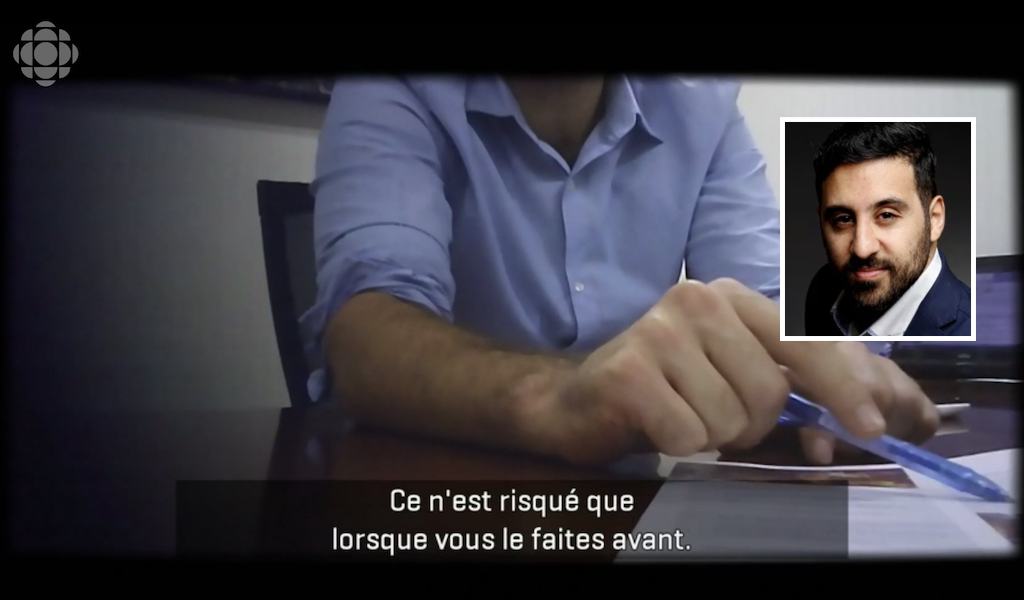Tajick: Public Broadcaster Investigation Rocks Québec IIP
On the 20th of September, the whole investment migration industry in Canada was holding its breath before the airing of the Enquête investigation report on the Quebec Immigrant Investor program.
The investigation team went undercover in Hong Kong to unravel the darkest secrets of the program and the industry. It came with the purpose to burn the program and did a very good job of it. They went looking for the devil and made sure to find one at every corner. They trapped a few immigration companies in Asia and unraveled a series of abuses.
The underlying tone of the report
It’s easy to see that the report had a direct intention to destroy the program by targeting immigration consultants, the immigrants themselves, and even the government reporting of the benefits; it used hyperbole and sensationalism to get the point across.
It obviously wasn’t a balanced or academic-style report meant to analyze all the issues in an even-handed manner. If it were, it would have highlighted the nearly 50,000 applications trashed by the federal government a few years back, and that and that QIIP applicants have to wait a ridiculous and shocking 44 months to get their Permanent Residence from the federal government after eight months of waiting for their CSQ (Certificat de sélection du Québec).
The reporters asked a handful of ex-employees of the Ministry of Immigration for their testimony but masked their identities. The journalists interviewed three such functionaries but gave the most airtime to the one that made the most shocking and frankly bizarre statements, the one that most faithfully adhered to their narrative with sensationalist claims.
Addressing some of the fair criticism
The investigation team dressed up a Hong Kong local as a wealthy mainland businessman of questionable background, looking to immigrate to Canada.
The purpose was to catch, on hidden camera, immigration companies purposely implying that there are ways around the soft requirement to reside in Quebec, the obligation to declare all your assets, and of hiding dubious sources of funds or a criminal background.
Although any service provider can understand that a salesperson would try to find a solution for a client’s problem, the length to which some went to facilitate such circumvention on behalf of the client was shocking.
Attempting to get around the “intention to reside in Quebec” criterion is not shocking. Neither is declaring the minimum possible amount of assets because finding documentation from decades back to prove the provenance of all assets can be very difficult for nationals from emerging countries.
But one advisor really did cross the line by telling the man posing as a client how he could get a new identity, hide assets, and obfuscate a possibly criminal background by buying a Caribbean passport.
We know it isn’t true that you can get a new identity through a Caribbean CIP, nor get your application accepted by a financial intermediary, let alone the government, but the idea that some people in this line of business are this shady and hurting the industry is disconcerting. The industry has come a long way in becoming more transparent and legitimate, but we still have a long way to go.
The report also highlighted that QIIP applicants don’t remain in Quebec. In most cases, this is correct, but their report highly exaggerated the magnitude of the program. What they also didn’t know, because only a handful of avid observers are aware, is that the most recent statistics on the presence of immigrant investors of Quebec come from those who applied to the program in 2010. We know only the absentee percentage for the immigrant investors who
The report also highlighted that QIIP applicants don’t remain in Quebec. In most cases, this is correct, but their report highly exaggerated the magnitude of the program. What they also didn’t know, because only a handful of avid observers are aware, is that the most recent statistics on the presence of immigrant investors of Quebec come from those who applied to the program in 2010. We know only the absentee percentage for the immigrant investors who
Read also: Analysis: Does Investor Immigration Have a Future in Canada?
Nevertheless, this has become a problem recently, and the Vancouver media has repeatedly voiced concerns about this matter, blaming the province of Quebec for its hike in property prices. That may be the case, but such criticism is hypocritical because it is particular to the QIIP; Nobody raises an eyebrow when other classes of immigrants (skilled workers, entrepreneurs, reunified family members) move from Quebec to, say, Ontario.
The ex-government employees interviewed all said they experienced pressure from the ministry and the immigration consultants to have leniency towards applications. Government employees should not be under pressure from outside the government. Many financial intermediaries are frustrated by the lack of consistency applied by case officers.
Humans are not infallible, so it’s understandable that government employees would not be flawlessly professional at all times. It’s the government’s responsibility to ensure that employees be correctly trained and provided with the required resources and environment to do the best job possible, taking in consideration that they charge a massive 15,000 CAD per application.
Read also: Canadian Immigrant Investor Myth #1: They Pay Less Tax Than Refugees
The nightmare scenario for the consultant is to have a case officer that fails most of the applications that land on his desk. Like everywhere else, there are bad apples, and it’s important to weed them out quickly, especially those that might have a bias toward wealthy individuals.
Addressing the biased criticisms
The report repeatedly stated that the QIIP was an open door for criminals and the wealthy to wash their money. In the industry, we know that the QIIP is the most rigorous immigration program in the world. Unfortunately, the layman viewer will think the program a highway into Canada for gangsters and money launderers. But the truth is that the QIIP is one of only a handful of immigration programs around the world that requires of an immigrant that he declare all his assets, and that performs due diligence on his source of funds.
Read also: Tajick: 3 Common Myths Canadian Media Uses to Demonize Investor Immigrants
During the last part of the TV investigation, the reporters gave the podium to Ian Young of South China Morning Post, a journalist who regularly appears in Vancouver segments about immigrant investors. He claims that “the QIIP is a scam from start to finish. I think everyone who is involved in the program knows that,” and goes on to make ignorant and unfounded statements every few phrases, taking many shortcuts in logic and providing his opinion rather than facts.
To start with, anyone who tells you that
Read also: Canadian Immigrant Investor Myth #2: The Chinese Are Driving Up Property Prices
The silver lining
In open and free democracy, researched criticism of the government should always be welcome. Investigations like these are the ones that enable policy-makers to go back to the drawing board and improve our laws and regulations. A great deal of revealing and shocking information came out of the investigation. Hopefully, this will give the government of Quebec the will and opportunity to finally improve a program that has been left structurally unchanged for a long time.
Before people lose sleep over this TV investigation, they should know that it’s doubtful many people saw the report. The silver lining for the industry and all of those made to look bad in the story is that it aired at the same time as the Quebec election debate, which significantly reduced the magnitude of the negative impact.
What should Quebec do
Should the program close? In Quebec, we face problems in the health system, education and – to a much higher degree – in the construction sector. But we, naturally, didn’t close those sectors. I ask myself; when faced with difficulties, do I want my government to stop trying or to try harder? Should a government objective be abandoned whenever it encounters a challenge? Doesn’t it make more sense to try to improve it?
It’s been evident for a decade that the QIIP needs changes. The program could have had a much greater economic impact in the province than it currently has. The Quebec government cannot be absolved of any wrongdoing, but for someone who has been reporting on the CIIP and QIIP, I would lay the blame on the previous Federal government under the Conservative party. Their calamitous reign at Citizenship and Immigration Canada left profound scars and their incompetence in the CIIP dossier left me fuming. They blame everyone except themselves, comfortably omitting that they were in the middle of their second mandate and had brought limited changes to the program.
They launched a new investor program that was doomed from the start and made sure that the Quebec immigrant investor application processing time spiraled out of control. Immigration Quebec under Kathleen Weil had the intelligence to wait and see how the new federal investor program performed before making changes to their program. The following federal election and the swearing-in of the new government also delayed any amendments to the QIIP.
Let this report provide the occasion for Quebec to lead by example by tackling the retention problem head-on the coming months.
Stephane Tajick is a researcher in the field of investment migration, the developer of the STC database on more than 200 residence and citizenship by investment programs worldwide. He is a regular columnist at Investment Migration Insider.



